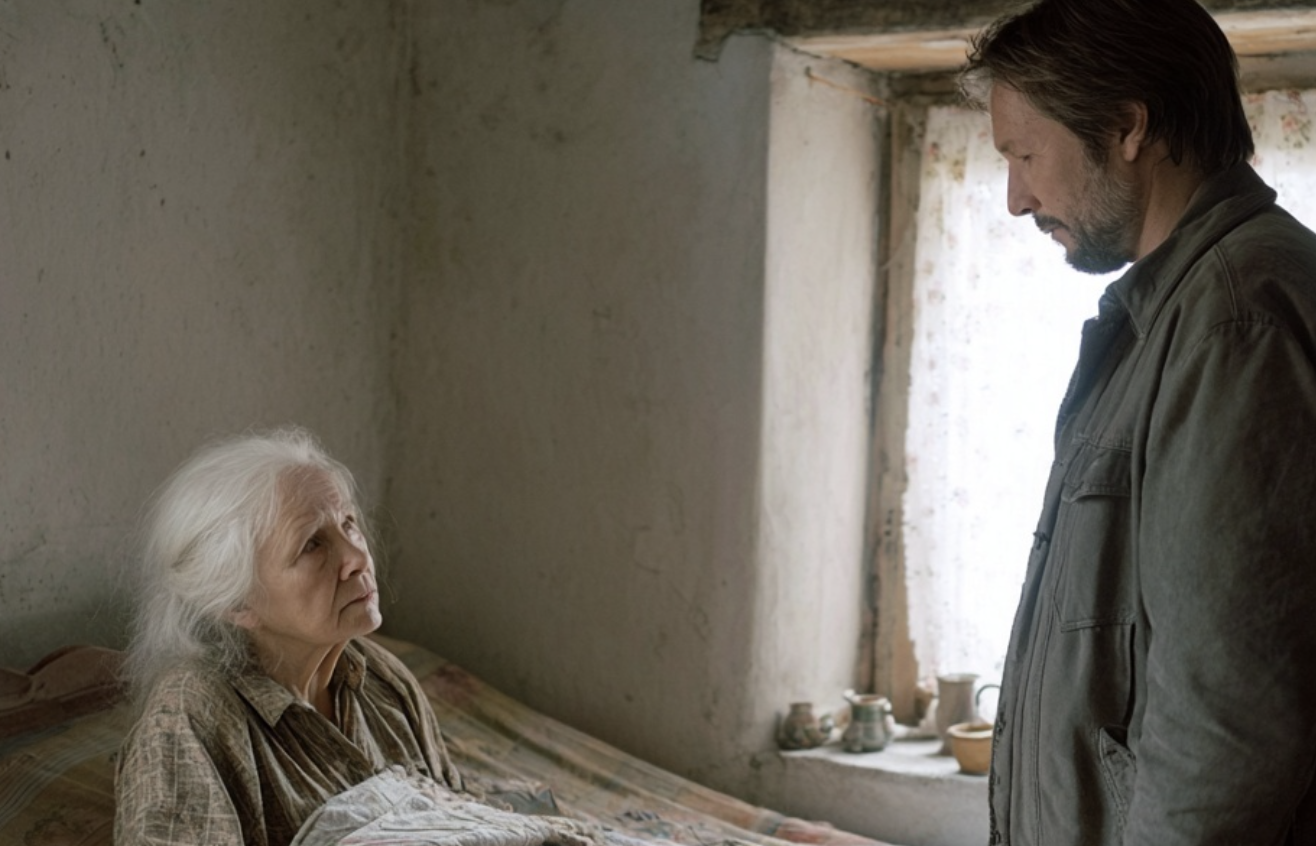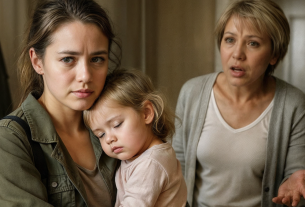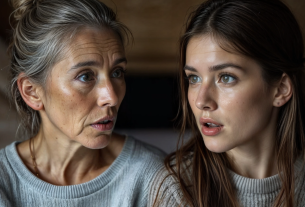The call from my aunt caught me in the middle of the workday, tearing me out of the monotonous drone of the office, where time dripped like an old, leaking faucet. I was sitting at my desk flipping through reports when suddenly my phone—usually silent as a coffin—vibrated with such persistence, as if trying to break through the layers of my indifference.
“Danila, come. Grandma Melanya is very bad. She won’t survive the night.” Aunt Klavdia’s voice trembled, like a string on a broken guitar.
I sat silent, staring at the plastic palm swaying in the air conditioner’s draft in the corner. Its leaves, artificial and lifeless, reminded me of that house—just as fake, just as hollow inside.
In my head, a neat line of reasons to refuse instantly formed. Grandfather died when I was nine. Mom and Dad crashed a year later. And Grandma Melanya… She hadn’t cried at their funeral. She stood like a black obelisk and whispered: “Weakness is a sin.” Then she took me by the hand and led me into a house that smelled of wax and decay.
“She’s calling for you,” Klavdia hissed into the receiver, as if reading my thoughts. “She keeps repeating only your name. Lying there, staring at the ceiling, as if seeing something through it… calling: ‘Danylushka… Danylushka…’”
That decided everything. Not out of love. Not out of duty. Something primal flared up in my chest—a mix of spite and trembling curiosity. I wanted to see her weak. I wanted those eyes—those black wells I had drowned in since childhood—to finally dim.
Memory struck like an axe on rotten wood. I was seven. We had come to stay at Grandma’s for a week. I accidentally broke her porcelain cup—a blue one with a golden rim, a gift from Grandpa. She didn’t scream. Didn’t hit me. She just grabbed my wrist so hard my bones cracked and dragged me into the cellar. It smelled of rotten potatoes and mouse droppings. The door slammed shut. In the dark, I heard her whisper through the crack: “Sit. Let fear eat the lies out of you.”
I screamed until I was hoarse. Then I cried. Then I prayed. And when the door finally opened, she stood like a statue, watching me crawl into the light. There was no malice in her eyes. Only… satisfaction.
I asked for leave at work, lying about “urgent family matters.” On the commuter train, tapping my knee, I remembered how Mom, before her death, squeezed my hand and whispered: “She’s not like others. Don’t believe her words. Believe mine.” Then the bus—dusty and creaky like an old stroller—carried me into the past. Outside the window flashed fields like faded wallpaper, and trees with branches stretching toward the sky like bony fingers.
The village greeted me with silence. Houses, overgrown with ivy and oblivion, looked at me with dark windows. One had its door gaping wide like a wound. Another had a rusty bicycle hanging on the fence, swallowed by grass. Grandma’s house, blackened by rain and time, stood on the edge of a ravine. Its roof sagged like the back of an old horse, and its windows, boarded shut, looked like scars.
Aunt Klavdia met me on the porch. Her face was worn like parchment, and in her eyes—fear, poorly hidden behind a smile.
“Long overdue,” she exhaled, hugging me. Her embrace smelled of onions and sickness. “She… she was waiting.”
Inside, the house hummed like a beehive. Dampness, mold, the smell of old books and something sweetly rotten that clung to the throat. Grandma lay on the bed, sunk into pillows. Her face resembled a wax mask—skin stretched over bone—and her eyes… They burned. Black, bottomless, like two holes into a world without light.
“You came…” she rasped, and there was no warmth in that sound. Only cold certainty. “I knew you would.”
I sat on a chair by the bed. The air was thick, like resin. It felt like every molecule was saturated with her will. To avoid suffocating, I asked quietly:
“Aunt Klavdia, maybe I’ll tidy up the attic? Nothing else to do while sitting around.”
She waved her hand as if brushing away a fly:
“Do what you want. Just don’t wake her.”
The attic was a kingdom of shadows. Dust lay so thick my bootprints remained like furrows in a field. Through a grimy window, light spilled, illuminating cobwebs woven like lace. Old trunks stood here, rusty tools, bundles of dried herbs, and in the corner—a doll with its head torn off, porcelain arms outstretched in pleading.
I opened a trunk. Beneath a layer of yellowed lace lay an album. Photographs. People in black dresses and suits, their eyes cut out with a knife, smeared with tar, covered with paper. Under one: “She laughed at my pain. Now she is silent.” Under another: “She stole my love. Returned me pain.”
But one photo made me tremble. A young woman with my eyes. My mother. Her eyes too were cut out. The caption: “Daughter. Weak. Left me.”
I grabbed the album and ran outside. The wind rustled in the leaves like the voices of the dead. I remembered how, on that last day before the crash, Mom hugged me and said: “If I leave, don’t let her rip the light out of you.”
That night I dreamt a dream. I stood in a field, not of wheat but of bones. The sky was the color of clotted blood. From the ground crawled people with empty eye sockets. They stretched their hands to me, and on their palms were burned letters: “Accept. Become strong.”
I woke drenched in sweat. The room smelled of ozone. On the wall above the bed, a silhouette appeared—a tall man in a black frock coat. Faceless. Eyeless.
The following days I spent in hell. Grandma didn’t die. She lay there, like a spider in a web, whispering incantations. Aunt Klavdia moved like a shadow, afraid to utter a word. And the house… The house lived its own life. Knives on the table pointed toward me. Strange faces flickered in the mirror. Once, I caught Klavdia trembling as she nailed the attic window shut.
“She must not get out,” she whispered. “She mustn’t…”
“Who?” I asked, though I knew the answer.
“You saw the album,” her fingers dug into my arm. “She collected souls. And now she wants to pass them on to you.”
The last night. I lay awake. Suddenly the door burst open. There he stood—the tall, faceless man in the frock coat, black as a starless sky. Shadow oozed from his empty sockets.
“It’s time,” he whispered. “The mistress awaits. The heir must accept the gift.”
My body wouldn’t move. Shadows crawled out of the walls—the people from the album, their faces twisted in pain. They seized my hands. The cold of their fingers seeped into my bones.
Grandma’s room. She sat on the bed, wreathed in black flame. Her eyes burned like coals.
“Here, grandson,” she hissed, holding out her hand. “All my power. All of them. They’ll be your slaves. You’ll be stronger than me. Just say yes.”
Voices in my head: “Avenge those who laughed at you…”, “Learn what the stars conceal…”, “No one will ever break you again…”
And then I remembered. Not words. A feeling. Mom’s hands stroking my head after the cellar. The smell of her hair—chamomile and rain. Her last whisper: “You are light, Danila. Don’t let her extinguish it.”
“No,” I whispered.
“NO!” I shouted, and my voice shattered like glass.
The room exploded with darkness. The faceless man crumbled into ash. The shadows screamed—their voices filled with relief. Grandma stared at me, and in her eyes, for the first time, flickered… fear.
“Fool…” she rasped. “You’ll die weak…”
Her body crumbled to dust. I rushed outside, ran through the forest until my legs gave out. At dawn, a truck driver picked me up. An old man with a face cut by wrinkles asked:
“Houses burning?”
I nodded.
“That’s for the best,” he said. “In such houses, shadows stay. Even after the fire.”
It’s been ten years since. I live in the city, work in a kindergarten. Every day I see children molding suns from clay, their laughter ringing like bells.
But at night, when silence grows thick like water, I feel him. The faceless man stands in the corner. He doesn’t come closer. Just waits.
Once, I asked my therapist:
“What do you do if fear becomes part of you?”
She smiled:
“Love isn’t the absence of fear. It’s the choice to move forward while holding its hand.”
Now, when the shadow appears, I turn on the light. I sit at the piano I bought to teach the children music and play the lullaby my mother used to sing.
Sometimes I think I hear someone softly humming along in the corner. But it’s probably just the wind.
Or maybe not.
P.S. The house burned to the ground. But in the ashes, they found one indestructible item—a porcelain cup with a golden rim. They brought it to me. I placed it on the windowsill. Every day, it holds fresh chamomile.



